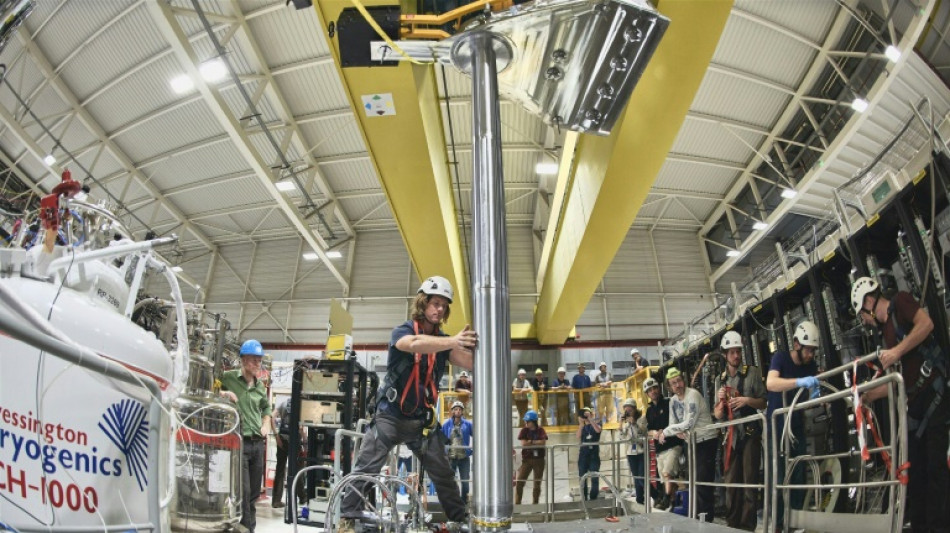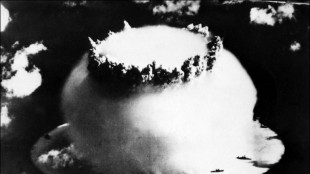
-
 Trump launches 'Board of Peace' at Davos
Trump launches 'Board of Peace' at Davos
-
Stocks rally as Trump drops Greenland tariff threats

-
 Mercedes unveil 2026 F1 car for new 2026 rules
Mercedes unveil 2026 F1 car for new 2026 rules
-
Djokovic, Sinner plough on in Melbourne, Wawrinka makes history

-
 Kitzbuehel's Hahnenkamm, the terrifying Super Bowl of skiing
Kitzbuehel's Hahnenkamm, the terrifying Super Bowl of skiing
-
'Oasis of stability': Madrid becomes luxury housing haven

-
 Swiatek says packed tennis season makes it 'impossible' to switch off
Swiatek says packed tennis season makes it 'impossible' to switch off
-
Sloppy Osaka grinds past 'mad' Cirstea to stay alive at Australian Open

-
 Iran Guards chief says 'finger on trigger', warns US against 'miscalculations'
Iran Guards chief says 'finger on trigger', warns US against 'miscalculations'
-
Imperious Sinner barrels into Australian Open round three

-
 Storms, heavy rain kill 9 children across Afghanistan
Storms, heavy rain kill 9 children across Afghanistan
-
Games giant Ubisoft suffers share price collapse

-
 Exhausted Wawrinka battles on in Melbourne farewell after five-set epic
Exhausted Wawrinka battles on in Melbourne farewell after five-set epic
-
'Too dangerous to go to hospital': a glimpse into Iran's protest crackdown

-
 Bruised European allies wary after Trump's Greenland climbdown
Bruised European allies wary after Trump's Greenland climbdown
-
Austrian ex-agent goes on trial in Russia spying case

-
 Japan suspends restart of world's biggest nuclear plant
Japan suspends restart of world's biggest nuclear plant
-
Djokovic, Swiatek roll into Melbourne third round, Keys defence alive

-
 New Zealand landslips kill at least two, others missing
New Zealand landslips kill at least two, others missing
-
Djokovic says heaving Australian Open crowds 'good problem'

-
 Swiatek in cruise control to make Australian Open third round
Swiatek in cruise control to make Australian Open third round
-
Austrian ex-agent to go on trial in Russia spying case

-
 Bangladesh launches campaigns for first post-Hasina elections
Bangladesh launches campaigns for first post-Hasina elections
-
Afghan resistance museum gets revamp under Taliban rule

-
 Multiple people missing in New Zealand landslips
Multiple people missing in New Zealand landslips
-
Sundance Film Festival hits Utah, one last time

-
 Philippines convicts journalist on terror charge called 'absurd'
Philippines convicts journalist on terror charge called 'absurd'
-
Anisimova grinds down Siniakova in 'crazy' Australian Open clash

-
 Djokovic rolls into Melbourne third round, Keys defence alive
Djokovic rolls into Melbourne third round, Keys defence alive
-
Vine, Narvaez take control after dominant Tour Down Under stage win

-
 Chile police arrest suspect over deadly wildfires
Chile police arrest suspect over deadly wildfires
-
Djokovic eases into Melbourne third round - with help from a tree

-
 Keys draws on champion mindset to make Australian Open third round
Keys draws on champion mindset to make Australian Open third round
-
Knicks halt losing streak with record 120-66 thrashing of Nets

-
 Philippine President Marcos hit with impeachment complaint
Philippine President Marcos hit with impeachment complaint
-
Trump to unveil 'Board of Peace' at Davos after Greenland backtrack

-
 Bitter-sweet as Pegula crushes doubles partner at Australian Open
Bitter-sweet as Pegula crushes doubles partner at Australian Open
-
Hong Kong starts security trial of Tiananmen vigil organisers

-
 Keys into Melbourne third round with Sinner, Djokovic primed
Keys into Melbourne third round with Sinner, Djokovic primed
-
Bangladesh launches campaigns for first post-Hasina polls

-
 Stocks track Wall St rally as Trump cools tariff threats in Davos
Stocks track Wall St rally as Trump cools tariff threats in Davos
-
South Korea's economy grew just 1% in 2025, lowest in five years

-
 Snowboard champ Hirano suffers fractures ahead of Olympics
Snowboard champ Hirano suffers fractures ahead of Olympics
-
'They poisoned us': grappling with deadly impact of nuclear testing

-
 Keys blows hot and cold before making Australian Open third round
Keys blows hot and cold before making Australian Open third round
-
Philippine journalist found guilty of terror financing

-
 Greenlanders doubtful over Trump resolution
Greenlanders doubtful over Trump resolution
-
Real Madrid top football rich list as Liverpool surge

-
 'One Battle After Another,' 'Sinners' tipped to top Oscar noms
'One Battle After Another,' 'Sinners' tipped to top Oscar noms
-
Higher heating costs add to US affordability crunch


Mysterious antimatter observed falling down for first time
For the first time, scientists have observed antimatter particles -- the mysterious twins of the visible matter all around us -- falling downwards due to the effect of gravity, Europe's physics lab CERN announced on Wednesday.
The experiment was hailed as "huge milestone", though most physicists anticipated the result, and it had been predicted by Einstein's 1915 theory of relativity.
It definitively rules out that gravity repels antimatter upwards -- a finding that would have upended our fundamental understanding of the universe.
Around 13.8 billion years ago, the Big Bang is believed to have produced an equal amount of matter -- what everything you can see is made out of -- and antimatter, its equal yet opposite counterpart.
However there is virtually no antimatter in the universe, which prompted one of the greatest mysteries of physics: what happened to all the antimatter?
"Half the universe is missing," said Jeffrey Hangst, a member of CERN's ALPHA collaboration in Geneva which conducted the new experiment.
"In principle, we could build a universe -- everything that we know about -- with only antimatter, and it would work in exactly the same way," he told AFP.
Physicists believe that matter and antimatter did meet and almost entirely destroyed each other after the Big Bang.
Yet matter now makes up nearly five percent of the universe -- the rest is even less understood dark matter and dark energy -- while antimatter vanished.
- Newton's apple flying up? -
One of the key outstanding questions about antimatter was whether gravity caused it to fall in the same way as normal matter.
While most physicists believed that it did, a few had speculated otherwise.
A falling apple famously inspired Isaac Newton's work on gravity -- but if that apple was made of antimatter, would it have shot up into the sky?
And if gravity did in fact repel antimatter, it could have meant that impossibilities such as a perpetual motion machine were possible.
"So why not drop some and see what happens?" Hangst said.
He compared the experiment to Galileo's famous -- though likely apocryphal -- 16th-century demonstration that two balls of different mass dropped from the Leaning Tower of Pisa would fall at the same rate.
But this experiment -- the result of 30 years of work on antimatter at CERN -- was "a little bit more involved" than Galileo's, Hangst said.
One problem was that antimatter barely exists outside of rare, short-lived particles in outer space.
However in 1996, CERN scientists produced the first atoms of antimatter -- antihydrogen.
Another challenge was that, because matter and antimatter have an opposite electrical charge, the moment they meet they destroy each other in a violent flash of energy scientists call annihilation.
- A magnetic trap -
To study gravity's effect on antimatter, the ALPHA team constructed a 25-centimetre-long (10-inch) bottle placed on its end, with magnets at the top and bottom.
Late last year, the scientists placed around 100 very cold antihydrogen atoms into this "magnetic trap" called ALPHA-g.
As they turned down the strength of both magnets, the antihydrogen particles -- which were bouncing around at 100 metres a second -- were able to escape out either end of the bottle.
The scientists then simply counted how much antimatter was annihilated at each end of the bottle.
Around 80 percent of the antihydrogen went out of the bottom, which is a similar rate to how regular bouncing hydrogen atoms would behave if they were in the bottle.
This result, published in the journal Nature, shows that gravity causes antimatter to fall downwards, as predicted by Einstein's 1915 theory of relativity.
In more than a dozen experiments, the CERN scientists varied the strength of the magnets, observing gravity's effect on antimatter at different rates.
While the experiment rules out that gravity makes antihydrogen go upwards, Hangst emphasised it did not prove that antimatter behaves in exactly the same way as normal matter.
"That's our next task," he said.
Marco Gersabeck, a physicist who works at CERN but was not involved in the ALPHA research, said it was "a huge milestone".
But it marks "only the start of an era" of more precise measurements of gravity's effect on antimatter, he told AFP.
Other attempts to better understand antimatter include using CERN's Large Hadron Collider to investigate strange particles called beauty quarks.
And there is an experiment onboard the International Space Station trying to catch antimatter in cosmic rays.
But for now, exactly why the universe is awash with matter but devoid of antimatter "remains a mystery," said physicist Harry Cliff.
Since both should have annihilated each other completely in the early universe, "the fact that we exist suggests there is something we don't understand" going on, he added.
T.Suter--VB



